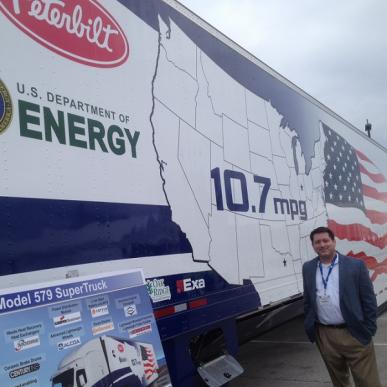 Here’s something to think about next time you are stuck in traffic next to an 18-wheeler: The average tractor-trailer can travel only six miles per gallon of diesel.
Here’s something to think about next time you are stuck in traffic next to an 18-wheeler: The average tractor-trailer can travel only six miles per gallon of diesel.
These heavy trucks travel a lot too; averaging more than 120,000 miles a year or 20 roundtrip drives between Boston and San Francisco. Freight trucks are on the road for one primary purpose: to get goods to all of us. In fact 70% of U.S. freight tonnage is moved by tractor-trailer trucks. Over the coming years, demand for freight services is expected to grow even more. And this is driving up fuel consumption and greenhouse gas emissions.
A call for strong fuel efficiency standards
But it is possible and affordable for tractor-trailer trucks to get nearly 11mpg by 2025. The Obama Administration can set new fuel efficiency and greenhouse gas standards for heavy trucks that cut fuel consumption by 40% compared to 2010 levels. These standards would also apply for heavy-duty work trucks, such as box delivery trucks, bucket trucks, beverage delivery trucks and refuse trucks.
Strong, new fuel efficiency and greenhouse gas standards for our nation’s heavy trucks are achievable, cost-effective and critical to cutting greenhouse emissions and fuel consumption – all while we continue to depend on trucks to deliver the goods we need and want. The slideshow below highlights some of the technology available to meet bold standards as well as the significant cost, oil and emissions savings from such standards.
Bold fuel efficiency standards are good for our economy, environment and energy security. One fact that just jumps out at me is this: These standards will cut our oil consumption by 1.4 million barrels a day. That sounds like a big number and it is. It’s a bit higher than the amount of oil we import daily from Saudi Arabia.
They will also be good for trucking fleets too. These trucks will cost $30,000 less to fuel a year.
Strong fuel efficiency and greenhouse gas standards for heavy trucks are an important part of the President’s Climate Action Plan, and EDF will continue to work towards strong standards through our unique combination of industry engagement, regulatory design expertise and technical know-how.
This post first appeared on our EDF Voices blog
2 Trackbacks
[…] By Jason Mathers […]
[…] By Jason Mathers […]